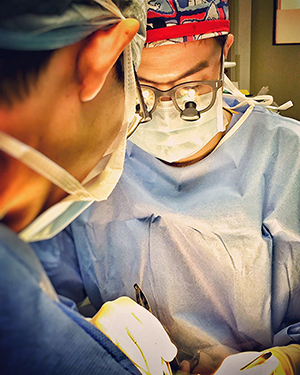
Vascular Surgery
What distinguishes vascular surgeons from other specialists who treat patients with vascular disease is their ability to combine skills in both open and endovascular treatments. Open vascular surgery is considered the “starting point” for endovascular surgery, since training and practice in vascular surgery require extensive knowledge of the basic science and a thorough education in general surgical techniques. In addition, surgeons must possess detailed specialized knowledge of the anatomy and physiology of arteries, veins and lymphatics and of the pathological processes that may affect them. This scientific and technical background is also imperative for endovascular surgery. Open vascular surgery can also be considered as a potential finishing point of endovascular surgery. In fact, open surgery is still often the only solution for complex cases considered unsuitable for an endovascular approach, or for different types of complications following endovascular treatments.
Vascular Surgery
What distinguishes vascular surgeons from other specialists who treat patients with vascular disease is their ability to combine skills in both open and endovascular treatments. Open vascular surgery is considered the “starting point” for endovascular surgery, since training and practice in vascular surgery require extensive knowledge of the basic science and a thorough education in general surgical techniques. In addition, surgeons must possess detailed specialized knowledge of the anatomy and physiology of arteries, veins and lymphatics and of the pathological processes that may affect them. This scientific and technical background is also imperative for endovascular surgery. Open vascular surgery can also be considered as a potential finishing point of endovascular surgery. In fact, open surgery is still often the only solution for complex cases considered unsuitable for an endovascular approach, or for different types of complications following endovascular treatments.


